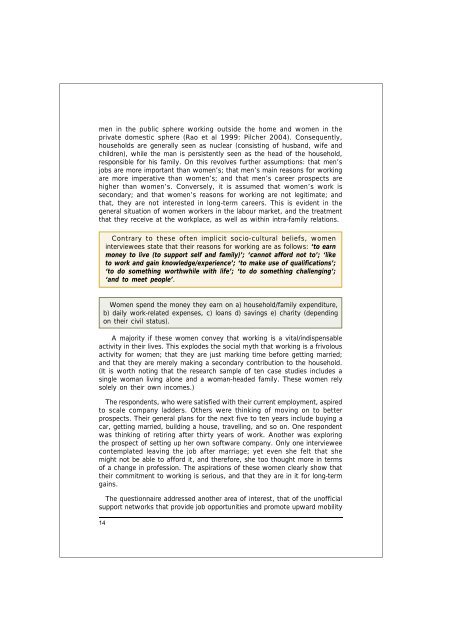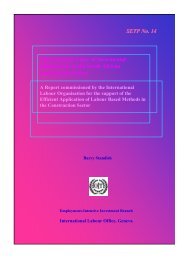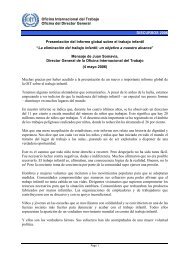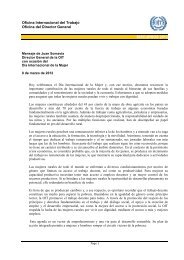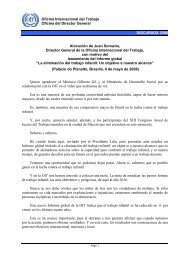Beyond Glass Ceilings and Brick Walls - International Labour ...
Beyond Glass Ceilings and Brick Walls - International Labour ...
Beyond Glass Ceilings and Brick Walls - International Labour ...
You also want an ePaper? Increase the reach of your titles
YUMPU automatically turns print PDFs into web optimized ePapers that Google loves.
men in the public sphere working outside the home <strong>and</strong> women in the<br />
private domestic sphere (Rao et al 1999: Pilcher 2004). Consequently,<br />
households are generally seen as nuclear (consisting of husb<strong>and</strong>, wife <strong>and</strong><br />
children), while the man is persistently seen as the head of the household,<br />
responsible for his family. On this revolves further assumptions: that men’s<br />
jobs are more important than women’s; that men’s main reasons for working<br />
are more imperative than women’s; <strong>and</strong> that men’s career prospects are<br />
higher than women’s. Conversely, it is assumed that women’s work is<br />
secondary; <strong>and</strong> that women’s reasons for working are not legitimate; <strong>and</strong><br />
that, they are not interested in long-term careers. This is evident in the<br />
general situation of women workers in the labour market, <strong>and</strong> the treatment<br />
that they receive at the workplace, as well as within intra-family relations.<br />
Contrary to these often implicit socio-cultural beliefs, women<br />
interviewees state that their reasons for working are as follows: ‘to earn<br />
money to live (to support self <strong>and</strong> family)’; ‘cannot afford not to’; ‘like<br />
to work <strong>and</strong> gain knowledge/experience’; ‘to make use of qualifications’;<br />
‘to do something worthwhile with life’; ‘to do something challenging’;<br />
‘<strong>and</strong> to meet people’.<br />
Women spend the money they earn on a) household/family expenditure,<br />
b) daily work-related expenses, c) loans d) savings e) charity (depending<br />
on their civil status).<br />
A majority if these women convey that working is a vital/indispensable<br />
activity in their lives. This explodes the social myth that working is a frivolous<br />
activity for women; that they are just marking time before getting married;<br />
<strong>and</strong> that they are merely making a secondary contribution to the household.<br />
(It is worth noting that the research sample of ten case studies includes a<br />
single woman living alone <strong>and</strong> a woman-headed family. These women rely<br />
solely on their own incomes.)<br />
The respondents, who were satisfied with their current employment, aspired<br />
to scale company ladders. Others were thinking of moving on to better<br />
prospects. Their general plans for the next five to ten years include buying a<br />
car, getting married, building a house, travelling, <strong>and</strong> so on. One respondent<br />
was thinking of retiring after thirty years of work. Another was exploring<br />
the prospect of setting up her own software company. Only one interviewee<br />
contemplated leaving the job after marriage; yet even she felt that she<br />
might not be able to afford it, <strong>and</strong> therefore, she too thought more in terms<br />
of a change in profession. The aspirations of these women clearly show that<br />
their commitment to working is serious, <strong>and</strong> that they are in it for long-term<br />
gains.<br />
The questionnaire addressed another area of interest, that of the unofficial<br />
support networks that provide job opportunities <strong>and</strong> promote upward mobility<br />
14


